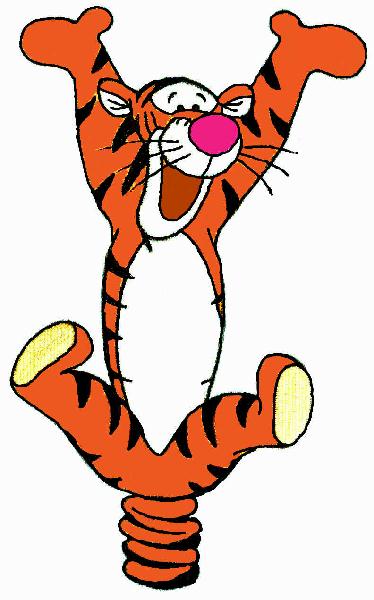T-I-double grrrr-R is gone, too =(

Voice of Winnie the Pooh's Tigger dies
Paul Winchell also created voice for 'The Smurfs'
LOS ANGELES, California (AP) -- Paul Winchell, a ventriloquist, inventor and children's TV show host best known for creating the lispy voice of Winnie the Pooh's animated friend Tigger, has died. He was 82.
Winchell died Friday morning in his sleep at his Moorpark home, Burt Du Brow, a television producer and close family friend, told the Los Angeles Times.
Over six decades, Winchell was a master ventriloquist -- bringing dummies Jerry Mahoney and Knucklehead Smiff to life on television -- and an inventor who held 30 patents, including one for an early artificial heart he built in 1963.
But he was perhaps best known for his work as the voice of the lovable tiger in animated versions of A.A. Milne's "Winnie the Pooh" -- with his trademark "T-I-double grrrr-R."
Winchell first voiced Tigger in 1968 for Disney's "Winnie the Pooh and the Blustery Day," which won an Academy Award for best animated short film, and continued to do so through 1999's "Winnie the Pooh: Seasons of Giving."
"I first met Walt Disney 25 or 30 years ago," Winchell recalled in a 1988 interview with The Associated Press. "He said, 'We're both in the same business. I use cartoons and you use dummies and we both entertain children.' That was long before I started working here. Walt gave me a VIP tour of the studio. I remember people doing voices. I said, 'Gee, that must be fun.' And here I am."
Winchell voiced memorable characters in numerous animated features over the years for Disney and Hanna Barbera. He was Gargamel in "The Smurfs," and Boomer in "The Fox and the Hound."
Winchell said he always tried to look for characteristics and idiosyncrasies in the voices he created. For Tigger, he created a slight lisp and a laugh. He credited his wife, who is British, for giving him the inspiration for Tigger's signature phrase: TTFN. TA-TA for now.
In 1974, he earned a Grammy for best children's recording with "The Most Wonderful Things About Tiggers" from the feature "Winnie the Pooh and Tigger Too."
At the age of 13, Winchell was a winner on radio's "Amateur Hour" for doing his imitation of Edgar Bergen and Charlie McCarthy. Ventriloquist Bergen was his childhood hero, and Winchell said one of the greatest thrills of his life was a joint appearance with Bergen on the game show "Masquerade Party."
Winchell made his television debut in 1947 with a smart-mouthed puppet he had invented in his early teens, and within a year was host of "The Bigelow Show." He was also host of a number of children's shows, including "The Paul Winchell-Jerry Mahoney Show" and "Circus Time."
In 1950, Winchell created Knucklehead Smiff and introduced him on "The Spiedel Show," which later became "What's My Name?"
Despite his success in television, Winchell felt the medium did not do justice to his beloved craft.
"Ventriloquism today is in a slump," he told the AP. "I think television defeats ventriloquism. Children are so used to seeing puppets that when they see a real ventriloquist they don't understand it. On television, everyone talks and they don't care about the mechanics."
Winchell's dummies are now at the Smithsonian Institution in Washington.
Winchell was born in New York City on December 21, 1922. He contracted polio at age six and overcame speech impediments as he learned to throw his own voice.
Winchell attended Columbia University and also studied and practiced acupuncture and hypnosis and became a prolific inventor.
He donated his early artificial heart to the University of Utah for research. Dr. Robert Jarvik and other researchers at the university went on to build an artificial heart, dubbed the Jarvik-7, which was implanted into patients after 1982.
Among Winchell's other patents: a disposable razor, a flameless cigarette lighter and an invisible garter belt.
Winchell is survived by his wife of 31 years, the former Jean Freeman; five children and three grandchildren.




 Curvaceous, voluptuous women are more likely to live longer than their slimmer friends. For good looks and good health, the feminine ideal really should be an hourglass figure with well-defined hips. Think Catherine Zeta-Jones and Sophia Loren.
Curvaceous, voluptuous women are more likely to live longer than their slimmer friends. For good looks and good health, the feminine ideal really should be an hourglass figure with well-defined hips. Think Catherine Zeta-Jones and Sophia Loren.
















